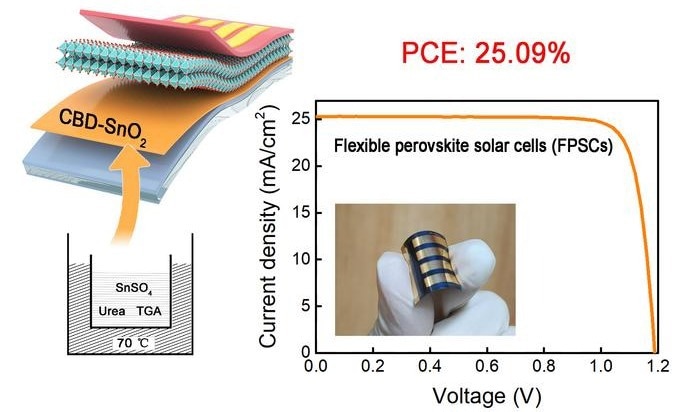Low energy conversion efficiency has restricted the practical usage of flexible solar cells, despite their many potential uses in flexible electronics and aerospace. A novel manufacturing technique has boosted the power efficiency of flexible solar cells crafted from perovskite, a group of compounds characterized by a distinct crystalline structure that enhances the conversion of solar energy into electricity.
 SnSO4 is used as a tin precursor for the tin oxide (SnO2) deposited as the electron transport layer of FPSCs. A new CBD manufacturing method allows more control over SnO2 growth, improving the overall power conversion efficiency of the solar cell and increasing the practicality of flexible solar cell technology. Image Credit: iEnergy, Tsinghua University Press
SnSO4 is used as a tin precursor for the tin oxide (SnO2) deposited as the electron transport layer of FPSCs. A new CBD manufacturing method allows more control over SnO2 growth, improving the overall power conversion efficiency of the solar cell and increasing the practicality of flexible solar cell technology. Image Credit: iEnergy, Tsinghua University Press
Flexible perovskite solar cells (FPSCs) currently face the challenge of lower power conversion efficiency than rigid perovskite solar cells. This issue arises due to the soft and inhomogeneous nature of the flexible base material, typically polyethylene terephthalate (PET), upon which the perovskite films of FPSCs are constructed.
FPSCs are not as durable as rigid solar cells, with glass serving as the basic substrate. The perovskite materials in flexible solar cell substrates deteriorate because of pores that let oxygen and water in.
A group of material scientists from the State Key Laboratory of Power System Operation and Control at Tsinghua University and the National Center for Nanoscience and Technology in Beijing, China, collaborated to address these problems with the current FPSC technology. They created a new fabrication method that boosts FPSCs' efficiency and opens the door for much wider application of the technology.
The research was published in the journal iEnergy, by Tsinghua University Press.
Increasing the power conversion efficiency of FPSCs is crucial for several reasons: higher efficiency makes FPSCs more competitive with other solar cell technologies, decreases the cost per watt of generated electricity and resources needed to produce the same amount of electrical power, and increases the range of applications where FPSCs can be practically used, including aerospace and flexible electronics where space and weight are at a premium,
Chenyi Yi, Associate Professor and Study Senior Author, State Key Laboratory of Power System Operation and Control, Tsinghua University
In particular, the group created a novel technique called chemical bath deposition (CBD) that allows for the deposition of tin oxide (SnO2) on flexible substrates without the need for strong acids, which are harmful to many flexible substrates.
The researchers had more control over the formation of tin oxide on the flexible substrate. An essential component of the FPSC for power conversion efficiency is tin oxide, which acts as an electron transport layer.
This CBD method differs from previous research by using SnSO4 tin sulfate rather than SnCl2 tin chloride as a tin precursor for depositing SnO2, making the new method compatible with acid-sensitive flexible substrates.
Chenyi Yi, Associate Professor and Study Senior Author, State Key Laboratory of Power System Operation and Control, Tsinghua University
Some of the durability issues with FPSCs have also been addressed by the new production technique.
The residual SO42- sulfate left over after the SnSO4-based CBD additionally benefits the stability of the PSCs because of the strong coordination between Pb2+ lead from perovskite and SO42- from SnO2. As a result, we can fabricate higher quality SnO2 to achieve more efficient and stable FPSCs.
Chenyi Yi, Associate Professor and Study Senior Author, State Key Laboratory of Power System Operation and Control, Tsinghua University
At 25.09%, the team set a new record for the best power conversion efficiency for FPSCs and received certification at 24.90%. The SnSO4-based flexible solar cells' capacity to withstand 10,000 bends while retaining 90% of their power conversion efficiency served as additional evidence of their robustness. In comparison to SnCl2-based flexible solar cells, SnSO4-based flexible solar cells showed high-temperature stability.
The research team's innovative manufacturing technique increased the viability of scaled FPSC production by yielding repeatable results and enabling manufacturers to reuse the chemical bath.
Yi said, “The ultimate goal is to transition these high-efficiency FPSCs from laboratory scale to industrial production, enabling widespread commercial application of this technology in various fields, from wearable technology, portable electronics, and aerospace power sources to large-scale renewable energy solutions.”
Authors including Ningyu Ren, Liguo Tan, Minghao Li, Junjie Zhou, Yiran Ye, and Boxin Jiao from the State Key Laboratory of Power System Operation and Control in the Department of Electrical Engineering at Tsinghua University in Beijing, China; and Liming Ding from the Center for Excellence in Nanoscience (CAS) in the Key Laboratory of Nanosystem and Hierarchical Fabrication (CAS) at the National Center for Nanoscience and Technology in Beijing, China contributed to the research.
The study was funded by the National Key Research and Development Program of China National Natural Science Foundation of China, Tsinghua University Initiative Scientific, Independent Innovative Research Program, Department of Electrical Engineering, Tsinghua University, State Key Laboratory of Power System and Generation Equipment, China Postdoctoral Science Foundation, Chinese Thousand Talents Program for Young Professionals, State Grid Corporation of China, National Bio Energy Co. Ltd.,
Journal Reference:
Ren, N., et al. (2024) 25% — Efficiency flexible perovskite solar cells via controllable growth of SnO2. IEnergy. doi.org/10.23919/ien.2024.0001
Source: http://www.tup.tsinghua.edu.cn/en/index.html